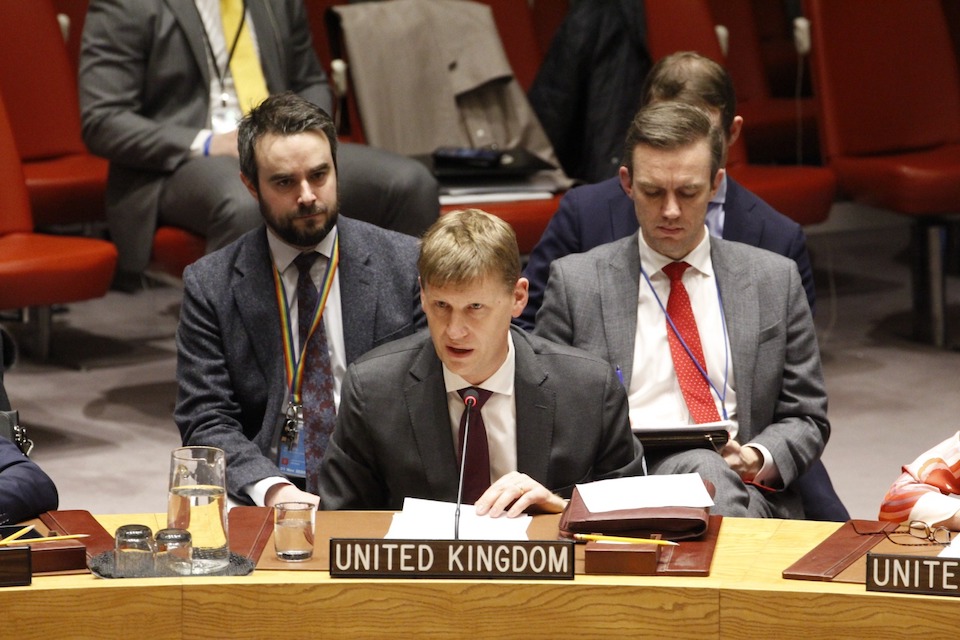Upholding the UN Charter in order to end the violence in Syria
Statement by Ambassador Jonathan Allen, UK Deputy Permanent Representative to the UN, at the Security Council briefing on Syria

Mr President, thank you. We welcome the attendance and briefing by the Secretary-General today and of course by Undersecretary-General DiCarlo. We share the Secretary-General’s concern at the gravity of the situation, the real risk of escalation, and echo his call for an immediate ceasefire.
This Council has met so often over the past few weeks to express its horror at the humanitarian catastrophe unfolding in Idlib. Indeed, we met only yesterday to discuss the suffering of the Syrian people caused by the merciless and disproportionate campaign being waged by the Syrian regime and its Russian backers: the 948,000 people displaced in the last three months; the men, women and children living in tents and the open air; the children freezing to death and killed in attacks on hospitals, schools and makeshift camps. We called in the name of humanity for those waging this offensive immediately to cease hostilities. And yesterday we warned of the recklessness and brutality of the Syrian and Russian offensive and the risk they escalate this conflict further.
It is therefore with deep concern and regret that because of those reckless and reprehensible attacks on Turkish positions only hours after the conclusion of yesterday’s meeting, it has been necessary to call another meeting today. But meet we must. As members of this Council we all have a duty under the United Nations Charter to take primary responsibility for the maintenance of international peace and security and therefore to seek to prevent further escalation of what is already a dangerous and fraught situation. And it is clear that the only way forward is an immediate cessation of hostilities and provision of humanitarian relief. I hope all members of this Council will agree with that today.
Mr President, let me say that we were shocked and appalled to hear of the tragic deaths of at least 33 Turkish soldiers as a result of those attacks yesterday. We condemn those attacks. We express our deepest condolences to the Turkish government and people, with whom we stand in solidarity as allies today.
Mr President, we are gravely concerned about the impact on civilians of a further escalation in hostilities. The bombing and shelling and fighting not only directly cause civilian suffering, but they also hamper the aid effort, magnifying the scale of this disaster. It is the civilians, in desperate need of food, water, healthcare and assistance to survive the cold of winter, who suffer most. It is vital that the United Nations and its humanitarian partners continue to be able to deliver cross-border aid and that humanitarian and medical actors are able to provide assistance to all those in need in the north-west in safety.
Mr President, as we have said before, it is clear that the Astana format is not capable of achieving a lasting ceasefire. The fatal flaw in the Astana format is Russia’s uncritical support for the Syrian regime and its continued disregard for previously agreed ceasefires and agreements, as well as its disregard for international humanitarian law and the fate of Syria’s people. We must therefore support the UN and Special Envoy Pedersen in securing a ceasefire in northwest Syria in close consultation with the relevant parties and the UN Security Council. We call on all Member States to work with and support the UN in this goal.
Mr President, responding to Syria’s and Russia’s increased offensive against the Syrian people, Foreign Secretary Dominic Raab said today that “there is no justification for such blatant disregard of international law or basic human decency”. Syria and Russia must immediately turn off this offensive. Russia should prioritise the Syrian people and the safety of the region over the interests of the murderous cabal at the heart of this conflict.
Thank you, Mr President.